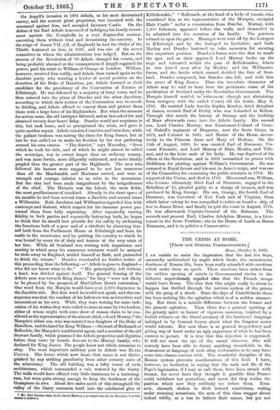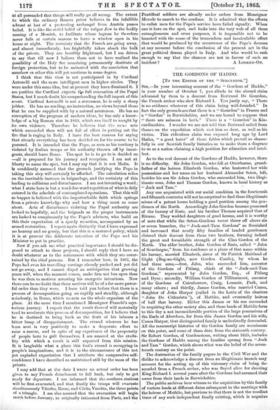THE CRISIS AT ROME.
[FROM OUR SPECIAL CORRESPONDENT.]
Rome, October 9, 1865.
I AM unable to resist the impression that the last ten days,
outwardly undisturbed by aught which broke the monotonous deadness of Roman life, have been really attended with emotions which make them an epoch. These emotions have arisen from the sudden opening of minds in Governmental circles to the hitherto superciliously repelled .idea that the French troops would leave Rome. The idea that this might, really be about to happen has thrilled through the nervous system of the priests with the pang of a shock. Since the days of Castelfidardo there has been nothing like the agitation which is of a sudden simmer- ing. But there is a notable difference between the former and the present agitation. Then there was a general uprising of the priestly spirit in favour of vigorous measures, inspired by a foolish reliance on the literal accuracy of the bombastic language indulged in by General Goyon about what his Emperor never would tolerate. But now there is as general despondency and giving way of heart under an ugly experience of what he has been content to permit. It is true that this dejection is suppressed.
It will not meet the eye of the casual observer, who will scarcely have been able to descry anything remarkable in the demeanour or language of such stray ecclesiastics as he may have
come into chance contact with. The wonderful discipline of the Roman system prevents manifestations of this kind. I have,
however, no hesitation in saying that the rank and file of the Pope's legionaries, if I may so call them, have been struck with tremor, for never have they thought it possible that France could withdraw her protection, and never did they realize the position which now they suddenly see before them. Even now, alarmed, shaken in their inward convictions, reeling under stunning sensations, the men of this class stagger about indeed wildly, at a loss to believe their senses, but yet not
at all persuaded that things will really go all wrong. The extent to which the ordinary Roman priest believes in the infallible advent at last of a protecting archangel from Austria passes belief. It is like the stolid belief of the vulgar Jew in the bodily coming of a Messiah, to facilitate whose ingress he therefore never fails at certain seasons to leave a window open in his house at night. The certainty that the French are going away, and almost immediately, has frightfully taken aback the bulk of the priests. They are horribly frightened, but I am driven to say that till now I believe them not to have realized the possibility of the Holy See remaining permanently destitute of foreign protection, but to be animated with the conviction that somehow or other this will yet continue in some degree.
I think that this view is not participated in by Cardinal Antonelli and the more intelligent men in higher circles. They were under this same idea, but at present they have dismissed it. I am positive the Cardinal expects tae full evacuation of the Papal States, but I much doubt his comprehending the full import of this event. Cardinal Antonelli is not a statesman, he is only a sharp jobber. He has no reading, no instruction, no views beyond those that he can be supplied with by a natural astuteness. He has no conception of the progress of modern ideas, he has only a know- ledge of a big Roman riot in 1849, which ran itself to naught by its own violence. Therefore he believes that the same arts which succeeded then will not fail of effect in putting out the fire that is raging in Italy. I have the best reasons for saying that already everything has been decided on for the course to be pursued. It is intended that the Pope, as soon as his territory is violated by Italian troops or his authority thrown off by insur- gents, should leave Rome. The spot he is to go to is decided on —all is prepared for his journey and reception. I am not at liberty to name the spot, but I may say that it is not Malta. It Is confidently assumed that the grounds justifying the Pope in taking this step will certainly be afforded. The calculation relies on the inevitable increase in brigandage, and the certainty of this leading to collisions and disturbances. I am not inventing a word ; what I state here is but a word-for-word repetition of what is drily entered in the schedule of contemplated operations. That this will so happen is believed with the imperturbable faith which springs from a private knowledge why and how a thing must so come about. Acts of disturbance violating the Papal authority are looked to hopefully, and the brigands as the proper instruments are looked to complacently by the Pope's advisers, who build on this their expectation of a speedy re-action, accompanied by an armed restoration. I repeat again distinctly that I have expressed no hearsay and no gossip, but that this is a matured policy, which it is at present the deliberate intention of the Pope and his Minister to put in practice.
Now if you ask ma what practical importance I should be dis- posed to attach to these projects, I should reply that I have no doubt whatever as to the seriousness with which they are enter- tained by the chief persons. But I remember how, in 1861, the Pope had even his travelling carriage already packed and yet did not go away, and I cannot dispel an anticipation that growing years will, when the moment comes, make him not less open than he was then to motives arresting his energetic intentions. Now there can be no doubt that these motives will be of a far more power- ful order than they were. I have told you before that there is a process of decomposition going on rapidly and steadily, although noiselessly, in Rome, which re-acts on the whole organism of the place. At the same time I mentioned Monsignor Franchi's mys- terious journey. I expect that the result thereof will materially tend to accelerate this process of decomposition, for I believe that he is destined to bring back as the fruit of his labours a bitter lump of disappointment. The errand whereon he has been sent is very positively to make a desperate effort to raise a rescue, and in spite of my experience of the propensity of people here to gull themselves, I am amazed at the credu- lity with which a result is still expected from this mission. It is laughable what a place this fool's errand is occupying in people's imaginations, and it is to the circumstance of this not yet exploded expectation that I attribute the comparative self- confidence I have described as maintained still by the mass of the priests.
I may add that at the date I wrote no actual order has been given to any French detachment to fall back, but only to get ready for departure. I am informed that the southern stations will be first evacuated, and that finally the troops will evacuate simultaneously Viterbo, Rome, and Civita Vecchia, the three points of a triangle. I am also assured that the evacuation will begin much before January, as originally intimated from Paris, and the Pontifical soldiers are already under orders from Monsignor Merode to march to the confines. It is admitted that the efforts to enlist men for the Pope's service have failed signally. When one is here on the spot, and looks into the very web of all these entanglements and cross purposes, it is impossible not to be haunted with the sense of the tremendous and incalculable effect that would be produced by the occurrence of the Pope's decease at any moment before the conclusion of the present act in the great political drama played in Italy. And who would be rash enough to say that the chances are not in favour of such an































 Previous page
Previous page